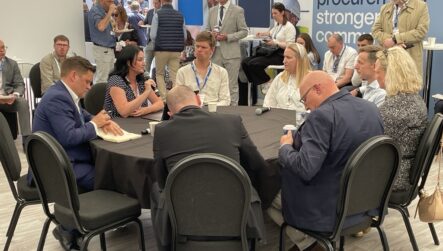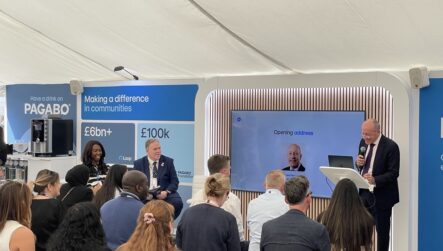Insight Report: Pagabo Live | Best Practice for Sustainable and Ethical Procurement

Episode seven of Pagabo Live was centred around the best practice for sustainable and ethical procurement in the public sector – and the importance in getting it right. Multiple areas need to be considered, including sustainability of the supply chain, the balance it has to strike with value for money, where social value fits in, and how the upcoming procurement reform will affect things moving forward.
To ensure we received expert insight and different perspectives across the industry, we were joined by Peter Masonbrook, regional director and head of social value at AtkinsRéalis, Shauna Young, head of responsible business at McLaughlin & Harvey, and our very own head of delivery, Ben Jones. As always, the discussion was hosted by Pagabo Live mainstay, Tom Snee of Cartwright Communications.
Thanks to their insights, Pagabo Live’s mission of promoting knowledge was once again realised. At the end of the session, 84% of people reported feeling aware or very aware of what sustainability and ethics incorporates in relation to procurement – an increase of almost 30% on the beginning of the webinar.
So, without further ado, let’s dive into some of the standout points and learnings.

The importance of sustainable and ethical procurement
Ben Jones kicked things off by highlighting the importance of ethical and sustainable procurement for framework providers. It should effectively be the cornerstone between the provider and the supplier, with framework providers having a duty to have highly-qualified and incredibly experienced teams to support clients and suppliers. As part of our Pioneering Ethical Procurement process we have implemented a six-point plan which sets out a commitment to a compliant procurement process that is fair, open, transparent and works for all.
An interesting perspective from the private sector was then given by Peter, who explained how it is the responsibility of an organisation to demonstrate how the frameworks they utilise are held to high ethical standards, for which Pagabo’s compliance checklist is a helpful tool. This not only gives assurance and confidence to public sector clients, but also ensures a business works in a fair, open and transparent way. They can do this through providing value for money, undertaking market testing, setting benchmarks, and ultimately, putting people first.
When creating procurement strategies, there was a clear agreement on how it’s all about encouraging good behaviours and early engagement with the market. Gone are the days of focusing on cost above all else. There is now an onus on bringing opportunities to market that require businesses to focus on modern dilemmas, like sustainability, social value and the green agenda.
These modern factors have also created a seismic shift to years gone by – with businesses turning down projects that don’t suit their business ethics. We also now have a system which often provides an advantage to those working ethically and sustainably, going above and beyond to create positive impact outside of day-to-day work.
This point was supported by Shauna, who emphasised that core business objective today – including at McLaughlin & Harvey – is maintaining sustainable growth and relationships across key networks. Accurate measurements and complete transparency with the value chain will always be at the heart of such objectives, and it was encouraging to see strong agreement from the audience – 95% of report having some form of sustainability and ethics strategy in their business.
What changes will procurement reform bring?
The short answer is – a lot.
The revised act is being introduced for a number of reasons, but to summarise, the idea is that this way of working will make things more efficient for both councils and suppliers. Due to the sheer output of work that is required here in the UK, the new act aims to implement a system that meets the country’s needs while placing compliancy at the heart. And there will be an even clearer emphasis on transparency and a reluctance to focus on bottom line cost.
We will also notice a shift towards the inclusion of SMEs, making sure they are given the opportunity to compete for and win public sector projects. Meanwhile, a relaxation of previous restrictions – like supplier location – will give more flexibility to councils.
Shauna used this opportunity to look back at the past 20 years and discuss the gradual adoption of sustainable and ethical procurement practices, a point reinforced by another poll. Two thirds of our viewers make a sizeable consideration for sustainability and ethics when procuring projects – a number that will likely increase with the introduction of new bills and acts.
Value for money and balancing costs
The term ‘value for money’ has historic ties to indicating the cheapest option, but the word value should always link to the quality of work. A focus on quality allows clients to see wider outcomes beyond the confines of the job itself, which delivered in a sustainable way generates far more social value.
A shift from short-term costs to long-term benefit and value is required here. Considering the broader impacts of sustainability and ethicality may look more expensive at project inception, but deliver far more in terms of overall value through positive impact on the environment, people and the economy in the long run.
These decisions are also more straightforward to make now than ever before. Thanks to tools like Loop, we are able to make better informed decisions and in turn measure the positive impact a project can have – with accuracy and quality metrics having the power to prove value for money.
Peter highlighted that value for money has previously contradicted sustainable and ethical changes, namely due to lower costs. That’s why it is so important that tenders and frameworks align with ways to achieve value for money, including things like reinvestment into local communities and a focus on upskilling.
Data also plays a huge role when it comes to balancing cost and sustainability. Businesses can use new technologies to implement cost control strategies, as well offsetting some costs through things like waste reduction, which in turn reduces green tax.
How can clients ensure sustainability and ethicality throughout their supply chains?
As with many things, sustainability and ethical processes should be considered early on. However, our poll found that less than half of viewers consider sustainability and ethics at the start of a project.
When starting out, consideration should be given to an organisation’s size and the types of goods and services it procures – and where it procures them from. It’s also important a legislation check takes place for compliance purposes, as well as the implementation of a sustainable and ethical policy – essentially demonstrating social and environmental purpose and making considerations for the future.
Businesses must also avoid ‘impact washing’ or greenwashing. Accountability is key so businesses proceed with everything they’ve agreed to do, with everyone buying into this. In short – if you say you’re going to do something, do it.
Other factors which can ensure sustainability and ethics are ED&I, through engaging with those with a lower skills shortage or areas with decreased education standards, as well as fair payment and a commitment to net zero. Open reporting is also key.
How to mitigate risks when putting projects to market?
Peter revealed his two key stages for risk mitigation in a supply chain:
- Compliance prior to delivery, right from the onboarding of suppliers. This includes request evidence from the chain around their compliance and making them sign a code of conduct which reiterates how they are expected to behave. There is also the option to carry out audits with suppliers for quality checks.
- Enforce accountability. Ensure any sustainable and ethical objectives are achieved and any noncompliance is picked up and sorted at the earlier opportunities. Essentially, do what you said you would do, and avoid things like late payments to other areas of the supply chain.
Ben and Shauna added a few further insightful points, including:
- Keeping tabs on the financial sustainability of the contractors involved
- Checking procurement strategy, ensuring the right behaviors and projects are procured for
- Going for a ‘positive engagement’ approach over punishment
- Offering continuous education and collaboration where appropriate
- Be versatile to, and stay on top of, various changes
What considerations can be made with regards to social value?
Social value is naturally closely associated with sustainability and ethical processes. As mentioned briefly earlier, Loop helps those in the built environment keep on top of their social impact, and is available for use on Pagabo procured projects for free.
Social value acts as an enabler and a level of accountability at the same time, prompting organisations to make sustainable and ethical commitments – and making sure they are implemented and create a positive difference. Our panel discussed how social value objectives must be a collaborative decision with the client and project team – and that level of accountability should apply to all.
Once again, early engagement was the buzzword, with references to setting objectives specific to local areas and regional deprivation levels being a key to accuracy in forecasting and measuring – again something Loop is positioned to measure quickly and easily.
The main point from the social value discussion was how it can no longer be seen as tick box exercise and how subsequent implementation is essential for both future projects and the environment.
Watch back the full episode here.
Our next episode of Pagabo Live will take place on Wednesday 21 August at 3pm, when we will be putting a focus on decarbonisation. Register for Decarbonising Your Estate Through Effective Estates Management here.
Discover our frameworks



































